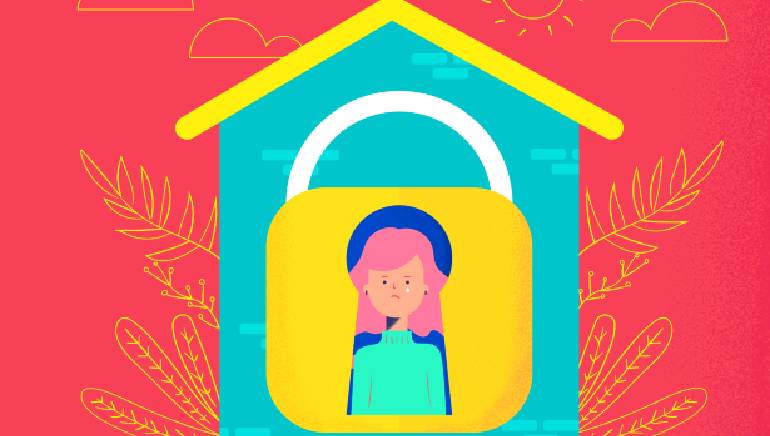
Does the statement, “I can’t do this anymore” seem to be a familiar reaction that you often experience during lockdown? Well, most introverts are presently dealing with a restless extrovert partner while working from home.
As we adjusted to quarantine life, being indoors has presented different scenarios for both introverts and extroverts. While some of us partnered with extroverts in the pre-pandemic world, we could have never imagined the sight of being lockdown with them, only to want to shake them off.
If you are an introvert who is working from home with an extrovert during quarantine then life must feel like a roller-coaster. During this pandemic, the introverts might find themselves anxious about their normal quiet spaces. While earlier they worked in solitude even while working from the office, now they’re left to deal with an extrovert partner also working from home.
While an introvert dreamt of a distraction-free workplace at home, in reality, they’re left to experience a partner constantly pacing around asking for help or just whining about feeling ‘stuck’. Interestingly, social distancing has increased the introvert-extrovert divide and made it more visible. Couples who have suddenly turn their home into sacred workplaces find that their need for social time versus alone time can be quite different from one another.

While introverts crave calm space, the extroverts might feel that the pandemic is a forced ‘time out’. Their natural need to interact when put on a halt might leave psychological scars with long periods of quarantine. The statistics of extroverts suffering from depression and anxiety making calls to mental health professionals have gone up.
Although the extroverts feel complete lack of social contact, for introverts who are more used to solitary pursuits, the time alone can be rejuvenating – and a relief from the distress brought on by news of the coronavirus. Indeed, the difference lies in what, cognitively, somebody finds “stimulating” as opposed to “exhausting”.
Also, Read: Fed up of working from home? Here’s how you can reclaim your lost productivity
The ball is in the introvert’s court to manage both workloads as well as deal with their extrovert partner’s predicament with calm composure. Sharing a few tips on handling an extrovert partner during quarantine, Dr Paras, life-leadership coach and psychotherapist is here to help.
Here are some things you need to take into consideration:
1. Identify the type of extrovert to understand their problem
According to new research, there are two types of extroverts, ‘Agentic’ and ‘Affiliative’. Both have distinct brain structures and distinct brain anatomies.
While agentic extroverts are the ‘go-getters’, the kind of outgoing people who are persistent, assertive, and focused on achievement, the affiliative extroverts tend to be more affectionate, friendly, and sociable.
Select Topics of your interest and let us customize your feed.
PERSONALISE NOWAfter identifying which category of behavioral patterns your partner falls in, you can conceptualise an effective strategy. Understanding the difference and identifying your partner’s behavioral category while help you stimulate your partner’s behaviour toward boredom and exhaustion. Thereby making it easy to avoid flight or fight response.

2. It’s time to have ‘the talk’
When you see your extrovert partner is dealing with boredom and feeling mentally exhausted, sit down, and have a conversation. Help them eradicate the problem and find a solution for it together. Give your extrovert partner positive reinforcement, and try not to judge so harshly or find a fault in everything they do.
3. Reinforce their positive traits and entice them to discover a new idea
It’s time to be a supportive partner and remind them about their positive traits and ask them to discover a new idea. Let your loved one know that you want to understand how he or she feels. When the person wants to talk, listen carefully, but avoid giving advice or opinions or making judgments. Just listening can be a powerful healing tool.
Instead of your partner succumbing to significant stressors, ask them to take this opportunity to find strength and try becoming mindful of the current scenario. Ask them to recognise the importance of structuring between social time and alone time while working from home during the pandemic.
4. Assist in diminishing your extrovert partner’s cabin fever
Cabin fever is felt experiences by extroverts and social distancing can lead them to adverse psychological and physiological effects.

Here are a few things you can do to maintain your extrovert partner’s overall health. Firstly understand the signs of “restlessness”, “persistent sadness or depression.” or just “difficulty concentrating” To cope deep dive into meditation, since the brainwave patterns into an alpha state that promotes healing. The mind post-meditation shall become fresh, delicate, and beautiful.
5. Structure your work from home routine
In the pre-pandemic world, no commute or drive-by meetings or dress code and remote working seemed like a dream. In reality personal obligations due to an extrovert partner get in the way. These distractions are easy to ignore in an office but at home, the line between personal and professional with your extrovert partner might blur.

Establish suitable working hours for you and an extrovert partner and make sure it isn’t chaotic at home. Schedule it in such a way that if you and your partner need to make calls, find a space that doesn’t intrude on your respective workspace.
Make time to eat lunch together. In case your partner isn’t working you can actually establish a plan where your partner is busy watching videos using headphones while you enjoy your work in silence.
6. Suggest them to use skype or zoom
Cabin fever is often a fleeting feeling. Your extroverted partner may feel irritable or frustrated suddenly for a few minutes or hours. Having a virtual chat with a friend or finding a task to distract their mind may help erase their frustrations.
Quarantine during a pandemic can be traumatic, but you can also use this opportunity to build a stronger foundation for your relationship and support each other in this tough time.